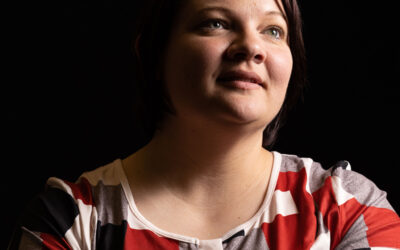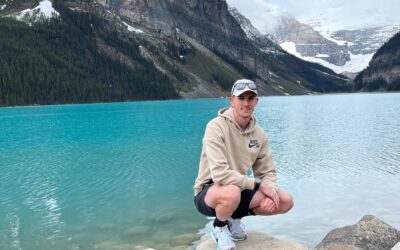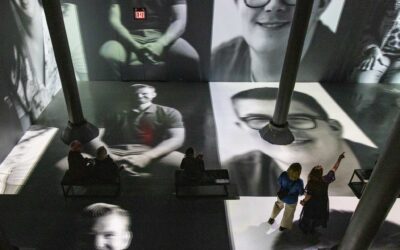blog
Finding My Way
by Olivia Castillo
September 30, 2025
Who am I?
I am a 19 year old girl from Capitola, California and coming this fall, I will be a junior transfer at the University of California Los Angeles majoring in Linguistics. I’ve chosen this path with the hopes of becoming a pediatric audiologist to help young people experience the world through sound, and so that children can experience an audiologist who is culturally aware of what it is like to have hearing loss. I’m just a regular girl figuring out what she wants to do in life and ready to make a difference. Except I am not a regular girl, I have Usher syndrome and the path I have chosen has a lot to do with my own journey with hearing and vision loss.
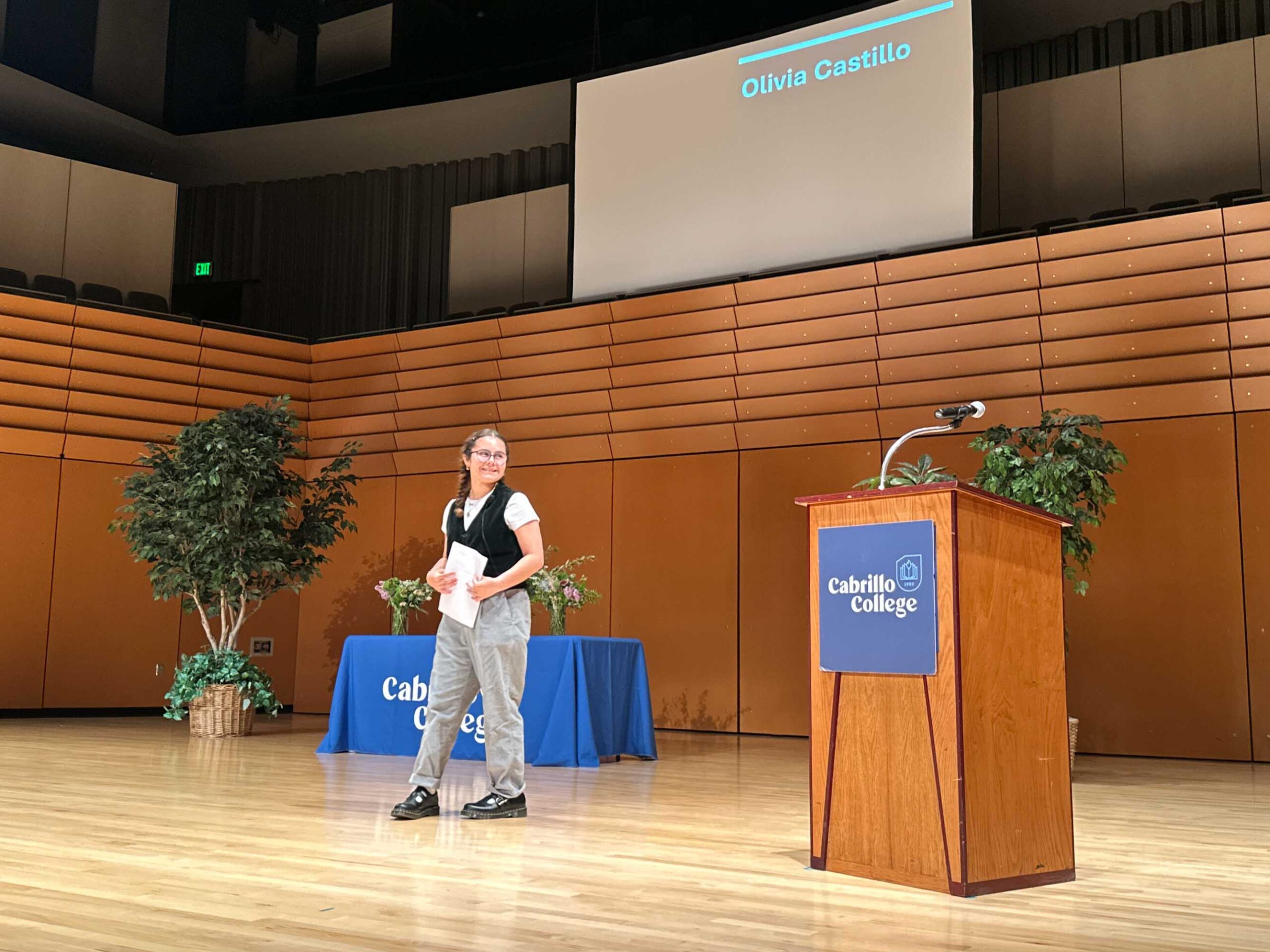
Olivia, standing on a stage, giving her speech about living with Usher syndrome

A side profile of Olivia as a baby showing off her hearing aids.
My Journey to the Diagnosis
My journey with Usher syndrome began before I even knew it had a name. From the moment I failed the hearing test at birth, it was clear that I was hard-of-hearing. This really set me apart from other kids my age. I grew up wearing big chunky hearing aids, having to walk up to my teachers everyday in school to remind them to wear my frequency modulation (FM) system, and being pulled out of class to work with the speech therapist I learned very early on to always make sure I was sitting at the front of the class and to communicate to my teacher when I missed instructions or needed any other accommodations. It wasn’t until I was in middle school, however, that I was diagnosed with Usher syndrome.
In seventh grade, I went to my yearly ophthalmologist appointment where the doctor noticed some spots in the back of my eyes. She could not identify why this was happening so I had to see a specialist. This led to a grueling day of intense eye testing at Stanford University which resulted in a diagnosis of retinitis pigmentosa (RP). With that, combined with my hearing loss, they concluded that I had Usher syndrome type 3A, which was later confirmed with genetic testing.
Making Sense
I always knew that my hearing loss would progress, it was the vision loss that was news to me. However, when I learned that one component of RP was the inability to see in the dark, it started to make sense. At science camp in elementary school, one of the activities was a night walk to look at the stars. The camp counselors did not allow us to use flashlights because they told us our eyes would soon adjust. I remember waiting and waiting more for my eyes to adjust. I was walking with little to no visual information and growing more fearful of tripping over something. Luckily, one of my classmates eventually offered to hold my hand and guided me through the walk. Looking back, this was the first experience I can remember when RP impacted my experience, and after I was diagnosed, I had an explanation. It was the first of many experiences where I felt unable to enjoy myself because of my night blindness, but also the first time when I felt immense gratitude towards someone for showing their kindness by guiding me.
In high school, because I grew up by the ocean, parties were bonfires on the beach at night. I quickly learned I didn’t enjoy them because the dark was a huge problem. People were annoyed when I used a flashlight and when I relied on my friends to guide me around, I felt left out and I didn’t enjoy myself. That feeling of being left behind or embarrassed was everywhere. When all my friends got their driver’s licenses, I felt completely excluded from their new independence and freedom. At school dances, I’d get lost in the dimly lit rooms. One time, while squinting to find my friends, I accidentally walked right up to a table of classmates without realizing it until they made a rude comment. These moments were challenging and made me feel unrelatable, embarrassed and alone.
A Shared Experience
My younger brother was also diagnosed with Usher syndrome soon after I was. Interestingly enough, Usher syndrome has expressed itself much differently in him in comparison to me. My brother was born with and still has perfect hearing, however, his vision loss has progressed more than mine has. When we are walking in the dark, I am the one who guides him, and when I don’t hear something, he repeats it to me. As I’ve learned more about Usher syndrome, I’ve learned how rare it is to also have a sibling with the condition and I feel incredibly grateful. Having a brother who also has Usher syndrome means I’m never alone, and together we have a unique understanding of the experiences that come with it, from the daily challenges to the long days of eye testing.

Olivia and her brother, Americo, posing in front of a beautiful view in the Blue Mountains of Australia.
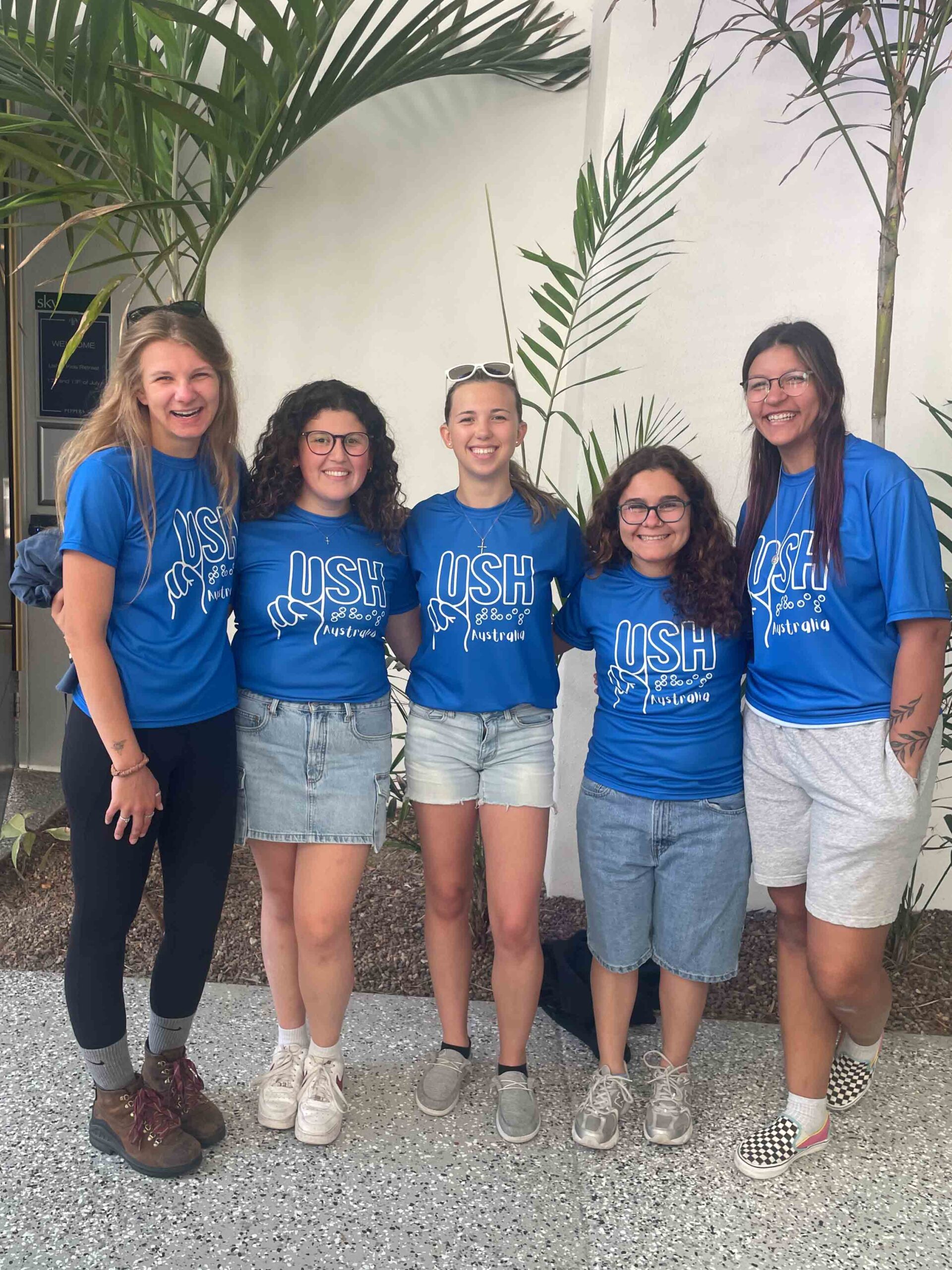
Olivia with 4 other USH mentors at USHthis camp in Australia.
From Diagnosis to Empowerment
Since graduating high school, my journey has been all about learning, reflecting, and finding resources for Usher syndrome. When I was first diagnosed, I was scared and would immediately get irritated whenever my parents brought it up. Connecting with people of all ages in the Usher syndrome community has completely changed this. It has had an immense positive impact on me and on my family’s life. We now have people to exchange similar experiences with, share information and resources, and simply connect with.
I now own a white cane and am learning to both use it and be confident in doing so. I am taking American Sign Language classes, for my own interest and as an added communication skill when I become an audiologist. I find myself to be much more confident and comfortable explaining Usher syndrome and how it affects me to the people around me. And in the spring of 2025, I gave a TedTalk at my community college about my experiences with Usher syndrome. Before this, I had never spoken about Usher syndrome in front of a large group before. It was incredibly intimidating to speak in front of an audience of both strangers and loved ones, but it was one of the most fulfilling experiences so far in my life. The positive feedback I received from the audience was incredibly validating, and it has empowered me to continue using my voice to advocate for myself and the Usher syndrome community as I continue to navigate throughout my life.
Explore more Blog posts
The Five Stages of Grief: A Journey with Usher Syndrome
blog The Five Stages of Grief: A Journey with Usher Syndrome by Sarah BaileyFebruary 9, 2026 I had always heard that loss follows a five-stage process: Denial, Anger, Bargaining, Depression, and finally, Acceptance. I never imagined that I would step onto the hamster...
Starting My Journey
blog Starting My Journey by Matt CameronDecember 15, 2025 I'm currently 28 years old. I was born and raised in Newcastle, New South Wales (Australia), but I currently live in Sydney. I was diagnosed with Usher syndrome Type 2, which means I have the typical...
See Us Hear Us: An Immersive Gallery Fundraiser
blog See Us Hear Us: An Immersive Gallery Fundraiserby Pamela AasenJanuary 12, 2026 On Thursday, October 23, I had the privilege of attending the incredible ‘See Us Hear Us’ fundraising event at Artechouse NYC, a premier venue in Chelsea known for hosting...
Help us find treatments and a cure.

